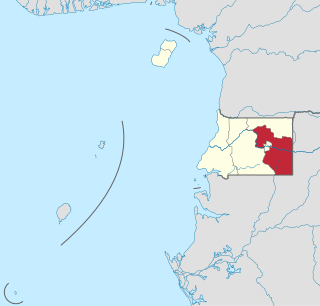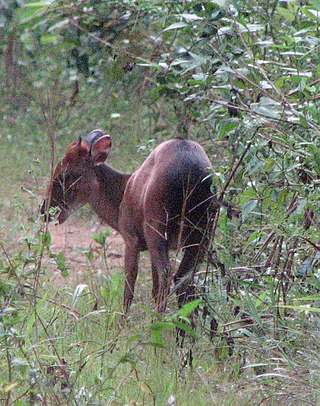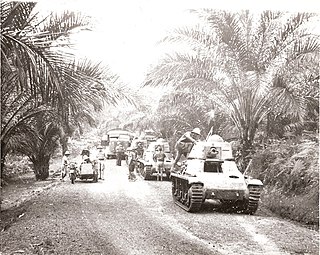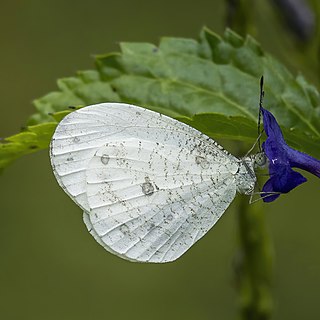
This article provides a breakdown of the transportation options available in Cameroon. These options are available to citizens and tourists such as railways, roadways, waterways, pipelines, and airlines. These avenues of transport are used by citizens for personal transportation, of goods, and by tourists for both accessing the country and traveling.

The Cameroon national football team, also known as the Indomitable Lions, represents Cameroon in men's international football. It is controlled by the Fédération Camerounaise de Football, a member of FIFA and its African confederation CAF.
The Gabon national football team represents Gabon in men's international football. The team's nickname is The Panthers and it is governed by the Gabonese Football Federation. They have never qualified for the FIFA World Cup, but have qualified eight times for the Africa Cup of Nations. Gabon is a member of both FIFA and Confederation of African Football (CAF).

The Central African Republic national football team, nicknamed Les Fauves, is the national team of the Central African Republic and is controlled by the Central African Football Federation. They are a member of CAF. Despite being traditionally one of the weakest teams in Africa and the world, they recently achieved success. They won the 2009 CEMAC Cup by beating Gabon in the semi-finals and Equatorial Guinea in the final 3–0. Their FIFA ranking rose from 202nd in August 2010 to 89th by July 2011. On 10 October 2010, they earned a shock 2012 Africa Cup of Nations qualifier win at home against Algeria 2–0, which put them top of their qualification group. The team won its first FIFA World Cup qualifier on 2 June 2012 after beating Botswana 2–0 at home.

Wele-nzas is a province in the eastern portion of continental Equatorial Guinea. Its capital is Mongomo. It borders the Equatoguinean provinces of Centro sur to the west and Kie-ntem to the north, with Gabon's Woleu-Ntem Province to the east and south. As of 2015, the population of Wele-nzas was 192,017. It derives its name from the Benito River and the Piedra Nzas mountain range.

Ambam is a town and commune in South Province of Cameroon on the border with Equatorial Guinea and Gabon. This frontier town is located approximately 220 km from Yaoundé and as of 2005 had a population of 1,596. Traditionally, it has traded with its neighbouring countries across the border. The Fang are the main ethnic group.

Peters' duiker is a small antelope found in Gabon, Equatorial Guinea, southern Cameroon, and northern Republic of the Congo.

The Battle of Gabon, also called the Gabon Campaign, occurred in November 1940 during World War II. The battle resulted in forces under the orders of General de Gaulle taking the colony of Gabon and its capital, Libreville, from Vichy France, and the rallying of French Equatorial Africa to Free France.

The Campo or Ntem River is a border river in Cameroon, mainland Equatorial Guinea and Gabon. It rises in Gabon, and flows into the Atlantic Ocean in Cameroon in the Bight of Biafra.
Kako is a Bantu language spoken mainly in Cameroon, with some speakers in the Central African Republic and the Republic of the Congo. The main population centres of Kako speakers are Batouri and Ndélélé in the East Region of Cameroon.
Eremospatha is a genus of climbing flowering plants in the palm family found in tropical Africa. These rattans are uncommon in cultivation and poorly understood by taxonomists. Closely related to Laccosperma, they are differentiated by the near complete absence of bracts and bracteoles. The name is from Greek meaning 'without a spathe'.
Aka, also known as Yaka or Beka, is a Bantu language spoken in the Central African Republic and Republic of Congo, along the Ubangi River dividing the two countries.
Baka is a dialect cluster of Ubangian languages spoken by the Baka Pygmies of Cameroon and Gabon. Ethnically, the people are closely related to the Aka, collectively known as the Mbenga (Bambenga). However, the languages are not related, apart from some vocabulary dealing with the forest economy, which suggests the Aka may have shifted to Bantu, with an estimated 15,000 people having done so.

The 2017 Africa Cup of Nations, known as the Total2017 Africa Cup of Nations for sponsorship reasons, was the 31st edition of the Africa Cup of Nations, the biennial international men's football championship of Africa organized by the Confederation of African Football (CAF). The tournament was scheduled to be hosted by Libya, until CAF rescinded its hosting rights in August 2014 due to the Second Libyan civil war. The tournament was instead hosted by Gabon. This event was also part of the Africa Cup of Nations 60th Anniversary.
Iyasa is a Bantu language spoken in Cameroon and Equatorial Guinea by the Iyasa and Ndowe coastal fishing peoples. It is also spoken by Pygmies, perhaps Babongo, in Gabon. Approximately 3,000 people speak Iyasa, though some note that this number may be an overestimation.
Bekwel (Bekwil) is a Bantu language of the Republic of the Congo. There are some 10,000 speakers there, with a quarter that number across the border in Gabon, and perhaps a similar on the opposite side in Cameroon. It is rather close to Nzime (Koonzime).
Leptosia hybrida, the hybrid wood white or hybrid spirit, is a butterfly in the family Pieridae. It is found in Guinea, Sierra Leone, Liberia, Ivory Coast, Ghana, Togo, Nigeria, Cameroon, Equatorial Guinea, Gabon, the Republic of the Congo, the Central African Republic, Angola, the Democratic Republic of the Congo, Uganda, Kenya, Tanzania and Zambia. The habitat consists of primary and riparian forest, including riverine vegetation that penetrates moist savanna.

Leptosia nupta, the immaculate wood white, petite wood white or immaculate spirit, is a butterfly in the family Pieridae. It was described by Arthur Gardiner Butler in 1873. It is found in Nigeria, Cameroon, Gabon, the Republic of the Congo, Angola, the Democratic Republic of the Congo, Uganda, Rwanda, Kenya, Tanzania, Zambia, Zimbabwe and on Madagascar. The habitat consists of wet, primary forest.
Mahongwe is an undocumented and threatened Bantu language spoken in Gabon. The Mahongwe language is a language spoken by the Mahongwe people, belonging to the Bantu ethnic group, who mainly reside in the central Gabon region. It is one of several Bantoid languages spoken in the Central African region.

The 2017 Africa Cup of Nations final was an association football match to determine the winner of the 2017 Africa Cup of Nations, organised by the Confederation of African Football (CAF). The match was held at the Stade de l'Amitié in Libreville, Gabon, on 5 February 2017 and was contested by Cameroon and Egypt. The sixteen teams who had qualified for the tournament were divided into four groups of four, with the top two from each group progressing to the knock-out phase. Cameroon finished as runners-up in Group A before defeating Senegal and Ghana in the quarter-final and semi-final, while Egypt reached for the final by first winning Group D and then beating Morocco and Burkina Faso.










